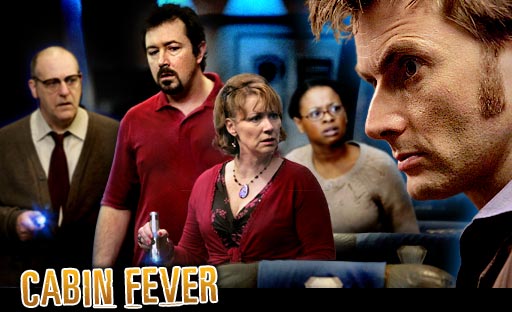
Aired 14 June 2008
‘Midnight’ is, simply put, a magnificent piece of science fiction and quite possibly the strongest episode Russell T Davies has contributed to Doctor Who yet. Saying that, there is unquestionably a polarizing aspect to it that, despite its sterling plot and characterizations, may leave some viewers underwhelmed and unfulfilled.
With Donna Noble enjoying a holiday, the Doctor boards a shuttlecraft to view the utopic and undisturbed splendour of the surface of the planet Midnight. What follows is a tightly-scripted character piece that explores what happens when a small group of confined people come under siege from a mysterious force outside, only to have the real menace secretly manifest within the shuttle. Indeed, ‘Midnight’ directly contradicts the underlying optimism of Doctor Who that people are inherently good in all places at all times across the cosmos. Here, the other passengers become the true villains of the piece as their inner natures and prejudices are slowly revealed, in a sense echoing what the Master reveals happens to humans trapped and without hope in ‘The Last of the Time Lords.’ It’s particularly interesting to note that, as individuals, each passenger does possess a sense of good, and it’s not until they start forming groups that these prejudices and poor decisions start to overtly manifest.
The reason ‘Midnight’ works so well is that Russell T Davies is incredibly adept and grounding his characters in reality and making them instantly relatable to the modern audience. In a nice montage scene where the Doctor tries to strike up conversations with everyone aboard, an absurd amount of knowledge is gained about each of the passengers is a short time. Ample introductions are given to Professor Hobbes who is quite dismissive and almost aggressive toward his research assistant alongside him, to the hostess who perfectly encapsulates the overworked everyman Davies loves to feature, and to the rather cynical family of Biff, Val, and Jethro. Val, in particular, has such a dominating personality that she essentially appoints herself leader and suggests some truly horrible courses of actions before rescinding and suggesting something else equally aggressive as the situation requires. She is able to come up with a story that essentially gives her what she feels in the power to bully others, particularly her family members, into doing what she demands. It’s an interesting spin on the typical middle-class family to be sure, and it’s telling that Sky, who is traveling by herself after coming out of a same-sex relationship, is the one who Val’s followers choose to gang up on first.
Besides playing to his own strengths as a writer by forcing characters to actually talk with each other Davies also avoids one of his weaknesses by eliminating any sort of overbearing technological or alien explanation for what has happened. Instead, he fully leaves it to viewers to piece together what occurred and to draw their own conclusions, accordingly. And while a lot of Davies’s previous work has shown how flawed the Doctor can be in different situations, here it’s his demeanour and reactions that get him into trouble that, for once, he can’t fully talk his way out of easily. The other passengers take note of his lack of explanations about himself as he continues to ask about them, as well as how joyous he seems to be that they’re under attack. His lack of answers certainly put a bevy of suspicion directly on him, and it’s unsurprising that the passengers would look to blame him for events when his voice is apparently stolen, the defining feature of the unseen alien threat. The Doctor staunchly believes in his individuality and knowledge, and ‘Midnight’ successfully highlights what happens when people don’t just fall into line behind him when his turns of phrase are thrown back at him while people continue to die.
In the end, though, it’s the absence of the companion that defines ‘Midnight.’ This is the first modern episode to feature the Doctor in a companion-lite tale, a counterpart to the upcoming ‘Turn Left’ which will focus on Donna in a Doctor-lite tale. As such, it becomes increasingly apparent just how necessary the companion is as even the smallest conversations can sometimes cause trouble for the Doctor without a friend there to smooth the edges as an intermediary when he says something with an inadvertent connotation. For an episode that had to juggle scheduling issues of its leads and budgetary issues with much more dog-eared for other episodes in the story, ‘Midnight’ manages to encapsulate everything that is great about Doctor Who and character pieces in general, though the lack of answers will certainly lead the audience divided.


December 10, 2020
[…] Gallifreyan Ramblings; The M0vie Blog; Demon’s Run; Spiralbound Notebooks; Tapetrade; Time Lord Archives; Junkyard View; Lyratek; Random Whoness; Doctor Who Reviews. […]